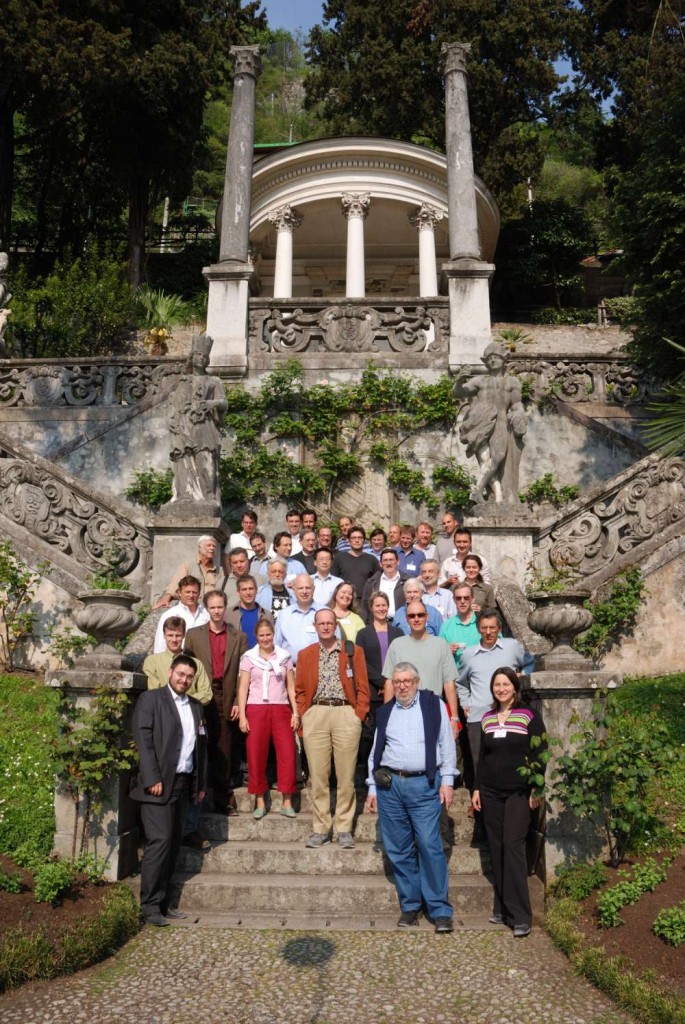
International Conference
Evolvability: the Evolution of Evolution
Villa Monastero, Varenna (Italy)
April 15 – 17, 2007
Daniel Dennett famously referred to evolution as a universal “acid”, from which no process was immune. The fact of organic evolution should not blind us, however, to deeper, and perhaps less explored, facets. Darwinian orthodoxy, for instance, not only presupposes random mechanisms, such as mutation, but also random out-comes. So far as the latter is concerned, however, the evidence from evolutionary convergence very much suggests that the end-points are much more constrained than sometimes imagined. So too the Darwinian paradigm is less well equipped to account for the emergence of complex systems. There is indeed a growing suspicion that the evolution itself “learns” how to evolve more effectively. This is enshrined in the concept of evolvability, whereby the existing framework allows organic systems to gear-up, perhaps at an increasing pace.
Evolvability, therefore, re-opens the question as to how organic systems not only work, but display an astonishing robustness to environmental insult. While mechanistic analogies are very widely used in described organic form and function, the reality is that the integration, scaling and self-repair mechanisms are far beyond what our existing technologies can achieve. It would not be surprising, therefore, if biological systems have shown both trends towards optimization, and also the ability to develop procedures that facilitate not only the evolutionary mechanisms themselves, but such features as homeostasis and developmental control. This general field of evolvability is at present relatively ill-defined and open-ended. It is also very wide ranging and cuts across existing boundaries and disciplines. Nevertheless it is very much “in the air” and we feel the time is very opportune to bring together a cross-disciplinary group to explore some of the implications.
Organized by
* “Piero Caldirola” International Centre for the Promotion of Science and International School of Plasma Physics
* John Templeton Foundation
* Associazione EURESIS
With the Contribution/Patronage:
Regione Lombardia
Provincia di Lecco
Comune di Lecco
Comune di Varenna
Fondazione CARIPLO
C.C.I.A.A. di Lecco
Banca Lecchese
Coordinamento Turistico del Lago di Como
Giornale di Lecco
Università di Milano-Bicocca
List of presenting partecipants
Chris Adami, Caltech
Uri Alon, Weizmann Insitute
Frances Arnold, Caltech
Lynn Helena Caporale
Michael Deem, Rice U
Nigel Goldenfeld, UIUC
Marc Kirschner, Harvard
Richard Lenski, Michigan State U
Lakshminarayanan Mahadevan, Harvard
Amos Maritan, U Padova
Martin Nowak, Harvard
Wilson Poon, U of Edinburgh
Rob Reenan, Brown
James Shapiro, U of Chicago
Ralf Sommer, Max Planck Institute, Tübingen
Sarah Teichmann, U of Cambridge
Andreas Wagner, U of New Mexico
Günter Wagner, Yale
William Wimsatt, U. of Chicago
For scientific questions:
Prof. E. Sindoni
e-mail: elio.sindoni_at unimib.it
For organizing/logistic/administrative questions:
D. Pifferetti
isplasma_at_tin.it